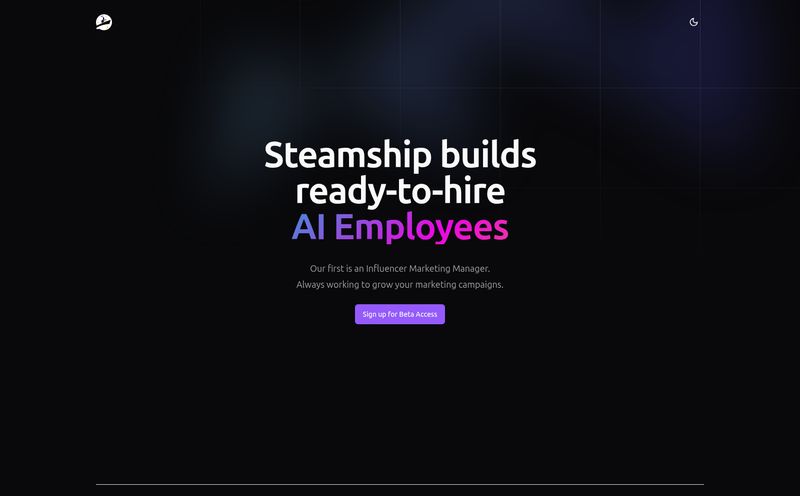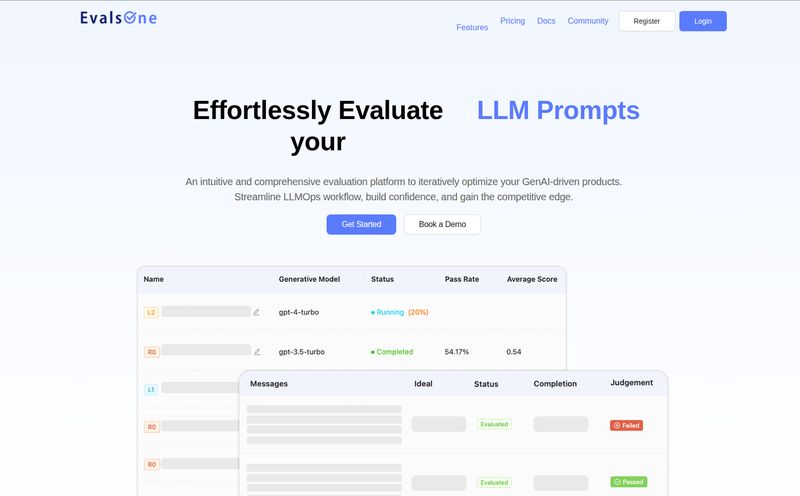We've all been there. You land on an e-commerce site, you know exactly what you want to buy, you type it into the search bar, and... crickets. Or worse, you get a page of completely irrelevant junk. It's the digital equivalent of asking a store clerk for a blue shirt and being shown a lawnmower. Frustrating, right? As someone who has spent years wrestling with traffic, conversions, and user behavior, I can tell you that a bad site search is a conversion killer. It’s a leaky bucket in your sales funnel.
For years, the solution was clunky plugins or monstrously complex, self-hosted options like Elasticsearch that required a team of wizards to maintain. But then platforms like Algolia started popping up, promising a new way. They call themselves an "AI search infrastructure," which sounds a bit like marketing fluff, but after kicking the tires, I get it. It’s not just a search bar; it's a whole engine dedicated to one thing: figuring out what your user wants, sometimes before they even finish typing.
What Exactly is Algolia? More Than Just a Search Bar
So, what’s under the hood? Algolia isn't a simple WordPress plugin you install and forget. Think of it as Search-as-a-Service. It’s an API-first platform that completely takes over the search functionality of your website or app. You feed it your data—products, articles, whatever—and it gives you back a lightning-fast, hyper-relevant search experience. The whole goal is to bridge the gap between what a user types and what they actually mean. It's less of a search index and more of a digital librarian who happens to be a mind-reader.
It powers search for some absolute giants, too. We're talking about companies like Slack, Stripe, and Lacoste. When you're dealing with that kind of scale, you can't afford a search bar that takes a coffee break. And according to Gartner, they've been a recognized leader in the space for two years running, which is no small feat in the cut-throat world of SaaS.

Visit Algolia
The Core Features That Make Algolia Stand Out
Okay, so it's fast and smart. But what does that actually mean in practice? It comes down to a few key components that work together.
Blazing Fast AI Search and Browse
Algolia’s speed is the first thing everyone talks about, and for good reason. We're talking about search results that appear as you type. This isn't just a gimmick; it provides immediate feedback to the user, helping them refine their query on the fly. This instantaneous response is critical for keeping users engaged. In a world where a few seconds of loading time can send bounce rates through the roof, this kind of performance is worth its weight in gold. Seriously, its a game-changer for user experience.
AI Recommendations and Personalization
This is where the "AI" part really shines. Algolia doesn't just match keywords. It learns from user behavior to personalize the experience. If a user frequently looks at a certain brand or category, Algolia will subtly push those results higher in future searches. It’s about creating a unique journey for each visitor, showing them what they’re most likely to be interested in. This goes way beyond basic search, turning it into a discovery tool that can seriously boost average order value and user retention.
The Merchandising Studio for E-commerce Gurus
For anyone in retail or running a marketplace, this is huge. The Merchandising Studio gives non-technical team members—like marketers and product managers—control over the search results. Want to boost a new product line for a week? Easy. Need to run a promotion and feature specific items when a user searches for "summer sale"? Done. You can drag and drop products to re-order results without ever touching a line of code. It’s a powerful way to align your search experience with your business goals.
Analytics That Actually Tell You Something
Most analytics platforms tell you what people clicked on. Algolia's analytics tell you what they searched for and found nothing. This is an absolute goldmine of data. Seeing your top searches with no results tells you exactly what content you need to create or what products you need to stock. It's a direct line into the mind of your customer, showing you their unmet needs. This has to be one of the most underrated features of the platform.
Who is Algolia Really For?
So, is this for the weekend blogger running a small site? Probably not. Algolia is built for businesses where search is mission-critical. I've seen it work wonders in a few key areas:
- E-commerce and Marketplaces: This is Algolia's bread and butter. For sites like those built on Shopify or Salesforce Commerce Cloud, where finding the right product quickly means the difference between a sale and a bounce, it's a natural fit.
- SaaS Platforms: For applications that need to help users find features, documents, or data within the app, Algolia provides a snappy, user-friendly experience. Think about searching for a conversation in Slack—that's the kind of seamlessness it provides.
- Media and Content Hubs: For websites with massive archives of articles or videos, helping users find relevant content is key to keeping them on-site. Algolia can cut through the noise and deliver the right content instantly.
While marketers will love the merchandising studio and analytics, let's be clear: you'll need a developer to get things set up. The good news is that Algolia has a reputation for great documentation and clean APIs, which developers tend to appreciate. The pre-built UI components also give you a massive head start, so you're not building everything from scratch.
My Honest Take: The Good and The Not-So-Good
No tool is perfect, and it’s important to see both sides of the coin. I've recommended Algolia to clients, but I've also recommended against it. It all depends on the context.
The Good Stuff
The speed is not an exaggeration. It's legitimately one of the fastest search solutions on the market. The scalability is also a massive plus. You don't have to worry about your search function crashing on Black Friday. It's built to handle immense traffic spikes without breaking a sweat. And from a developer's perspective, the API-first approach and the solid documentation make implementation relatively straightforward compared to the alternatives. It just works.
The Reality Check
Now, for the other side. First, the price. Algolia is a premium service, and its pricing reflects that. It's based on usage—specifically, the number of records you're indexing and the number of search operations you perform each month. For a small site, this can be a significant expense. Second, while the basics are easy, unlocking the full power of Algolia for a truly unique, customized experience requires some serious front-end development chops. It’s not a no-code solution for highly complex use cases. You're buying a world-class engine, but you still need a skilled driver to get the most out of it.
Let's Talk About Algolia Pricing
You won't find a simple pricing table on Algolia's website, and that's intentional. They use a quote-based model because usage can vary so dramatically between customers. A small SaaS company might have a few thousand records and a million searches a month, while a massive retailer could have millions of products and hundreds of millions of searches. The pricing scales accordingly. My advice? Don't be shy. Use their "Request a demo" button. Talk to their team, explain your needs, and get a concrete number. It’s an investment, so you need to weigh the cost against the potential lift in conversions and user satisfaction. If your current search is costing you money, Algolia might just pay for itself.
Frequently Asked Questions about Algolia
Is Algolia better than Elasticsearch?
It's not about better, it's about different. Elasticsearch is an incredibly powerful, open-source search engine, but it's a beast to manage. You are responsible for hosting, scaling, and maintenance. Algolia is a fully-hosted, managed service. You trade some of the infinite customizability of Elasticsearch for ease of use, incredible speed out of the box, and zero maintenance headaches. For most businesses, Algolia's trade-offs are a win.
Can I use Algolia on a WordPress or Shopify site?
Absolutely. Algolia has official integrations and plugins for major platforms like Shopify, Magento, and WordPress. These make the initial setup much simpler, allowing you to sync your products or posts to Algolia's index with minimal fuss.
How hard is it to implement Algolia?
The basic implementation, especially using their UI components, can be done surprisingly quickly—sometimes in a matter of hours for a skilled developer. A more complex, deeply customized implementation will naturally take more time and expertise. But getting a fast, functional search up and running is not a months-long project.
Do I need to be a developer to use Algolia?
To set it up and integrate it into your site, yes, you'll need a developer. However, once it's running, features like the Merchandising Studio and Analytics are designed to be used by non-technical team members like marketers and merchandisers.
What makes Algolia's AI search different from a standard search bar?
A standard search bar typically just matches the exact text you typed. Algolia's AI understands synonyms, handles typos gracefully, and learns from user behavior to personalize results. It also factors in business rules you set. It's the difference between a simple keyword matcher and a smart, learning-based discovery engine.
My Final Verdict: Is Algolia the Right Move?
So, here’s the bottom line. If you're a small business or a personal blogger, Algolia is probably overkill. But if you run a serious e-commerce, SaaS, or content-heavy business and your search functionality is either nonexistent or a source of customer frustration, then Algolia should be at the very top of your list to investigate. It's a premium product with a premium price tag, but it delivers a premium experience that can have a direct, positive impact on your bottom line.
Think of it as an investment in your user experience. In a crowded digital marketplace, a delightful and efficient search experience is no longer a luxury; it’s a competitive advantage. If your site’s search bar feels like a dead end, Algolia might just be the tool you need to turn it into a superhighway for conversions.
Reference and Sources
- Algolia Official Website
- Gartner Magic Quadrant for Insight Engines
- Algolia Integration on Shopify Plus



